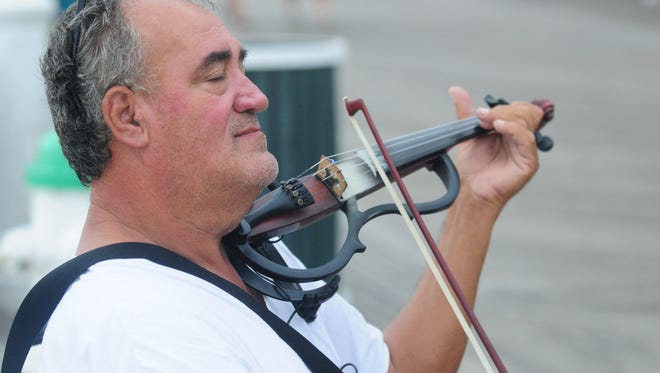Ocean City street performers fight for place on boardwalk

Bill Campion still has bright eyes and a youthful passion for his career, even at 82 years old.
Known as the "Mad Hatter" during his tenure as a street performer on the Ocean City Boardwalk, Campion has become a leader for the group that says they're being pushed out of town.
"What they're doing is wrong," Campion said. "They want us out, and they don't care how much money they waste doing it."
Campion's anger is founded in an ongoing legal dispute between the Town of Ocean City and the street performers that swarm the boardwalk during the summer seasons. The dispute began with a 2011 court case between spray paint artist Mark Chase and the town. The ordinance — intended to limit street performers to ends of streets, as well as ban all sales of artistic works — was found to be a violation of Chase's first amendment right.
In 2013, a second case between violinist William Hassay and the Town of Ocean City argued that the "30 foot" ordinance rule for sound violations, found in Section 30-272 of the Ocean City Town Ordinances, stands as a breach of First Amendment rights. The courts agreed, however, the code still exists in the town ordinances.
Attorney Guy Ayres, whose firm defended the town in all of these cases, said the code is no longer enforced, and he is currently seeking to repeal the code from the town ordinances altogether.
Additionally, Ayres said that the code's existence has nothing to do with street performers, but rather is attributed to loud music played out of boardwalk storefronts, which are typically 30 feet apart.

"They took up arms against this because they had a problem with the rule," Ayres said. "It had nothing to do with anyone receiving citations."
Following the 2013 court ruling, Ayres said that the town was obligated to stop enforcement of the code, but was not ordered to repeal it. Ayres stated that, while the code can, but isn't, enforced in other areas of the town.
"What makes the boardwalk different, and this code not applicable there, is the high amount of ambient noise," Ayres said. "You don't find that in other areas of the town."
However, the purpose of the shifts in ordinances, which boardwalk performers see as a personal attack, the town argues in court records, is to better protect the safety of the community by easing crowd congestion during the summer season. However, in court documents, Mayor Rick Meehan is cited as stating that crowds on the boardwalk are something both expected and desired.
"The reason they're doing this is not for safety," Campion said. "This is for the businesses, they want people to spend their money at the shops and restaurants. If a business has a performer out front, they can do whatever they want, so long as it brings in money."
Following this rulings, the Town of Ocean City has consistently filed to modify or vacate the consent decree, or, in other words, to rehear the case, or to get rid of the ruling, based on passage of new ordinances. Judge Ellen Hollander has consistently denied these requests, for the reason that there is no viable, legal evidence of an issue the ruling has caused.
Additionally, despite the ruling, court documents show dozens of ordinance violation citations given to performers following the 2013 ruling.
Due to Hollander's ruling of the town's ability to enforce areas for performances, in April 2016, Meehan passed Ordinance 2016-6, described as a lottery system, where performers apply for a randomly situated spot to perform on the Boardwalk. This follows ordinance 2015-11 in 2015, which states performers in which performers were forbidden from playing in obstruction of publicly owned property, such as benches or trashcans.
"The purpose of this is to control us," Campion said. "They want to make this as difficult as possible for us to perform."
Campion also noted that, following the ruling, he has never seen a performer reprimanded by police for performing outside of their space.
Concert violinist Lucian Ionescu had trouble performing on the boardwalk this past summer.
He believes police have begun to single him out recently.
"I've had an officer stand across from me and say if he can hear me from across the boardwalk, he can give me a $1,000 fine, or have me arrested," Ionescu said. "I said, 'Arrest me then.' "
Two incidents between Ionsecu and boardwalk patrol in July caused the American Civil Liberties Union, who had previously worked on behalf of the street performers, to draft a letter to the town on Aug. 4, notifying that enforcement of the ordinance was in contempt of the law.
Ayres has said the 30-foot rule was irrelevant in Ionescu's case, as his amplifier was inordinately loud, able to be heard at a distance of 150 feet.
"It runs on double-A batteries, how loud could it be?" Ionescu said.

In Ocean City, Campion cites considerably sums paid by the town as proof there is a monetary interest in curbing unsanctioned performances.
"We're talking nearly a quarter million dollars they've spent drafting legal documents," Campion said. "The people need to know how their tax dollars are being spent."
Records of receipts from the Baltimore-based Venable law firm, who drafted litigation for the town, shows a collection bills oriented around the drafting of Ordinance 2015-11, with numbers reaching above $30,000 in legal fees for portions of the process of writing the nine-page document. Additionally, a taskforce assembled to address these issues included only one street performer, William Chase.
The most recent court ruling, filed on Sept. 5, ruled that the town's motion to dismiss complaints of violations of First Amendment rights by performers was denied, as there is valid cause to believe that their rights are being infringed upon, according to court documents.
"This is an investment," Campion said. "Their goal was stop us, and it's for the best interest of revenue."